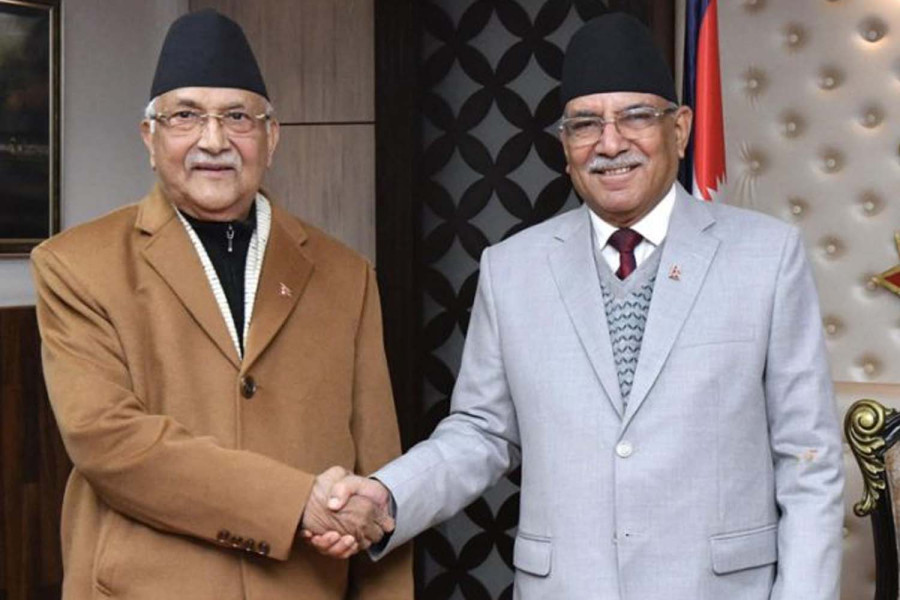Politics
As presidential vote nears, clouds gather over Maoist-UML alliance
Congress expects UML to ditch the Maoists. But PM Dahal reckons Oli has no option but to stay.
Tika R Pradhan
On Monday, Nepali Congress General Secretary Gagan Thapa claimed the ruling coalition would collapse by February 22.
But the Maoist Centre leaders believe the coalition could continue even after a new President is elected through consensus.
Thapa’s statement came after his recent meeting with Prime Minister and CPN (Maoist Centre) chair Pushpa Kamal Dahal with whom he discussed the presidential elections.
“The agreement [to stitch together the current coalition] made on December 25 will unravel on February 23,” said Thapa while addressing his party’s function at Bhairahawa on Monday. He didn’t elaborate.
This is not the first time Congress leaders have been hinting at the collapse of the existing coalition and revival of the previous Congress-Maoist Centre one. They believe that after the Maoist Centre votes in favour of a consensus candidate as new President, in what is also a Congress proposal, UML will pull out of the government, thus paving the way for the revival of the old coalition.
Thapa said the government formed “against the mandate of the election” will break. The people’s mandate, according to him, was to give continuity to the pre-election alliance in order to achieve national prosperity.
A Congress leader close to Thapa said the general secretary is not someone who speaks without basis.
“Dahal wants to lead the government for a full five-year term but if he continues to stick with Oli, his party will lose everything after he completes his half-term,” said Shankar Tiwari, a Congress leader and a political analyst. “So Dahal’s party will vote for a non-UML Presidential candidate, thereby breaking the coalition.”
But what if the UML does not withdraw its support to Dahal? Tiwari said if UML withdraws, Congress will give PM Dahal the vote of confidence but if not, Dahal could also remove UML ministers.
However, Maoist Centre leaders said the prime minister wants to take both the UML and the Congress along, a strategy that some UML leaders say could backfire.
“By the time of filing nominations for President, a situation in which both Congress and UML support a consensus candidate will arise,” said Manahari Timilsina, media advisor to prime minister Dahal. “The prime minister seeks the support of both major parties.”
Prime Minister Dahal and his party–CPN (Maoist Centre)–have already made it clear that the President should be elected through national consensus, given the controversial roles of two previous presidents: Ram Baran Yadav, who was a Congress leader, and Bidya Devi Bhandari, who represented the UML.
The party has claimed that the agreement of December 25 among the ruling coalition has been rendered insignificant after Dahal got a confidence vote from the Congress, the CPN (Unified Socialist) as well as the Loktantrik Samajbadi Party.
Thapa’s statement comes at a time when both the Maoist Centre and the UML are yet to come to an understanding on a presidential candidate, a decision which is sure to determine the future of the ruling coalition as well as national politics.
Nepali Congress lost all positions of power after Dahal joined hands with Oli following Congress President Sher Bahadur Deuba’s refusal to give him the premiership. But Deuba has realised his mistake and has been trying to mend fences by giving the confidence vote to Dahal.
The political parties have only 10 days to file nominations for the presidential election scheduled for March 9.
KP Sharma Oli, former prime minister and chairman of the biggest party in the ruling coalition, on Tuesday claimed that forces inside and outside the country are working to destroy the country. He was referring to the ongoing attempts to break the ruling alliance.
“We formed a new government after breaking the previous five-party coalition, which is a matter of success. Friends of our party are happy. We should be happy too, but what if this situation suddenly changes?” Oli asked, while addressing the inaugural ceremony of the 23rd National Convention of the All Nepal National Free Students’ Union, his party’s student wing. “The structure of [the current] Parliament itself is a cause of instability. No party has a majority… Powers in and outside [the country] are actively working to harm the country.”
Oli said that in order to rob a bank, one should first attack its guard and therefore the UML could face some attack as his party was the government’s guard.
“We have been attacked and we could be attacked again,” Oli said, referring to the upcoming presidential election.
The UML chair is aware that Prime Minister Dahal won’t support a candidate fielded without his consent and in that case, Oli’s party will have the option to pull out of the government, which will be a disaster for the UML. Maoist Centre leaders believe that a ‘cunning’ politician that Oli is, he won’t let that happen and will thus come to a compromise.
“We have heard that Oli has told his Secretariat members that the party should now be cautious as whatever the party’s recent gains were unexpected achievements and they must be saved,” said a Maoist Centre leader who is close to the prime minister. “This is also why we are hopeful Oli will ultimately come to a compromise on a consensus Presidential candidate.”
Not only Congress leaders, Upendra Yadav, chair of the Janata Samajbadi Party, one of the seven constituent parties of the ruling coalition, has also predicted that this government would fall before the elections of the President and Vice-President.
“This Prachanda-led government is the weakest in history,” Yadav said at his party’s function in Kapilvastu on Tuesday. “The government’s shape will change before the presidential elections.”
Yadav, who is dissatisfied with the ministries allocated to his party, has been skipping the meetings of the ruling coalition.




 18.12°C Kathmandu
18.12°C Kathmandu















